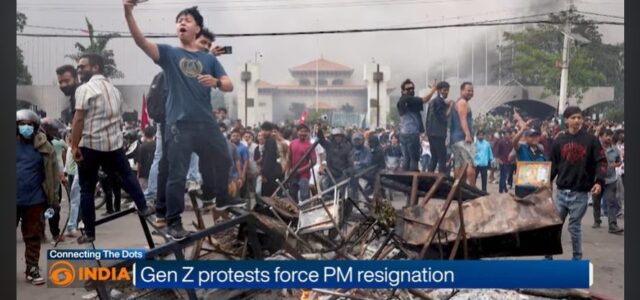Gen Z’s uprising: Asia’s youth are shaking governments—and refusing to back down
gen-zs-uprising-asias-youth-are-shaking-governments-and-refusing-to-back-down
#Gen #uprising #Asias #youth #shaking #governmentsand #refusing,
NEPAL/INDONESIA: Although separated by two thousand miles, Nepal and Indonesia are swept by similar virulent dissent, with protests in both countries spearheaded by Generation Z.
From social media bans to government perks, Gen Z fights back
The triggers vary in each country: Nepal confronted a contentious social media prohibition, while Indonesia grappled with excessive government fringe benefits. Nonetheless, the fundamental grievances are similar—no adequate jobs, pervasive government dishonesty, and escalating economic disparity.
“Youth are being forced into precarious jobs, even those with education,” explained Vedi Hadiz, professor of Asian Studies at the University of Melbourne. “They feel unprotected and see their futures slipping away.”
Unemployment and inequality fuel the flames
The numbers are troubling. According to the World Bank, almost 20% of young people in Nepal and 14% in Indonesia are unemployed. Hundreds of young citizens are abandoning Nepal for low-paying jobs overseas, while Indonesians are troubled and wrestling with the high cost of living. US tariffs imposed by President Trump made things worse, with rates of 19% on Indonesia and 10% on Nepal.
The sense of dissatisfaction and dashed hopes has driven thousands to take action. In Kathmandu, 28-year-old IT analyst Sahaj Shreseha joined protesters, hoping to gain a transparent government minus the traditional, inefficient, and toothless political leaders. “We just want new leadership, people who work for the people,” he said.
Deaths, resignations, and the rise of young political icons
Lamentably, the demonstrations had grave outcomes. In Nepal, at most, 72 lives have been lost in raging skirmishes, arson, and military suppression activities. In Indonesia, 10 people have been killed during the five-day upheaval. In one incident, 21-year-old food delivery rider Affan Kurniawan died, reportedly run over by a police vehicle — the tragedy caught on video, which went viral online, igniting more wrath from people.
The political consequences have been swift. In Nepal, Prime Minister K.P. Sharma Oli resigned and was replaced by 73-year-old Sushila Karki, a former Supreme Court Chief Justice and the country’s first female leader — a choice widely supported by student protesters. President Prabowo Subianto of Indonesia also acted and rolled back government perquisites and sacked five high-echelon ministers.
Social media mobilisation and the power of a frustrated generation
Social media proved to be a powerful weapon for Gen Zs — both as a platform for organising and as a megaphone for their petitions, demands, and postulations. Recordings of police atrocity, memes taunting the dishonest upper class and political leaders, and screams for justice have fuelled unmatched unity among young people, even persuading private high schools in Indonesia to declare public support and reinforcement for the movements.
In Nepal, many protesters look up to Kathmandu’s 35-year-old mayor, Balendra Shah, a former rapper known for his anti-corruption stance and Instagram presence. Though not directly involved in the protests, Shah encouraged the youth to stay resilient: “Now your generation will have to lead the country!” he declared to nearly 800,000 followers.
Entrepreneurs like Pukar Hamal, who runs a tech startup employing Gen Z Nepalis, believe the generation’s frustration is deeply rooted in global comparison. “They see progress in Singapore, Dubai, or the U.S., and they wonder why it’s not happening at home,” he said. “The connection between effort and progress feels fundamentally broken.”
As resentment grows against political dynasties and “nepo kids” flaunting privilege online, it’s clear Gen Z isn’t just protesting — they’re demanding a total overhaul. And with elections just around the corner, governments are forced to act and move.
But this may only be just the beginning.
